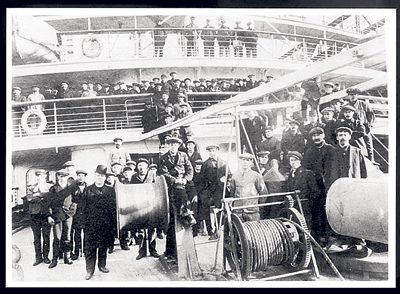Charles Scannell (25) from Roberts Cove, Minane Bridge, near Tracton, was employed at £6.50 per month as a fireman on Lusitania - one of 200 firemen and trimmers (known as the 'black gang') working in the engine room and coalbunkers.
CHARLES Scannell (25) from Roberts Cove, Minane Bridge, near Tracton, was employed at £6.50 per month as a fireman on Lusitania – one of 200 firemen and trimmers (known as the ‘black gang’) working in the engine room and coalbunkers.
On this, his second trip on the liner, he gives the Cork Examiner a chilling account of events on what began as a very ordinary day: ‘I was in the stokehold on the 8 a.m. to 12 noon watch, and on being relieved… washed, had a meal, and retired to my bunk in a room occupied by 16 others and myself… I could not sleep - I had a feeling that something was going to happen… a strange foreboding of disaster…’
Many passengers shared these worries. In the week before Lusitania sailed from New York, the German Embassy in Washington published warnings in the newspapers to tell passengers travelling on Allied ships that they did so ‘at their own risk’.
Scannell continued: ‘I must have been nearly a couple of hours there sleeping lightly when I heard a terrific noise, which brought me to my feet in an instant. The others were all awake, and as I opened my eyes I saw them making for the door. “What’s up?” I asked one of my mates… “She’s torpedoed,” he answered.
‘I seized my trousers… and ran from the room; and as I did so the vessel listed heavily and I was flung against the side. I had hardly recovered myself when there was an inrush of water from both sides, which nearly swept me off my feet.’
‘With difficulty I made my way to the top deck, and there I saw people crowding to the boats. It was all confusion. I managed to get into one boat, but it was too crowded, and I got out again. I got into another, but that was full up, and I left it.’
Hunting around for a lifebelt, he met a man carrying two, and asked him for one. But he said one was for his poor wife, who he couldn’t find. When Scannell eventually found one the tapes gave way, it was so old.
Sensing there was little chance of getting into a boat, he rushed to the stern. Being a fit man, and accomplished ‘on several athletic fields in the county,’ it came as second nature for him to slide down a line into the sea. As he did so, he ripped the flesh from his hands.
A short distance away he saw a boat and swam towards it, but it pulled away before he managed to draw close. He saw another, but failed to reach that also.
Suddenly, there was a tremendous boom. Turning in the water, he saw fire and smoke burst from the ship; with that the Lusitania went down.
‘Around me there were scores of people shouting and screaming, and all struggling – it was simply fearful. I still swam on, and suddenly found myself in a current that was dragging me back in the direction of where the vessel disappeared.’
After an hour in the water, he managed to reach safety on an upturned boat with some twenty other people. There he sat helplessly, watching ‘any number of people being carried past, some actually drowning – no sound from them; others still crying feebly; while more were yelling. I heard several people invoking curses on Germany... It was a dreadful sight.’
Four hours later, a trawler came along and took them to Cobh where he was provided with a suit of clothes. As far as he could tell, apart from himself, only two of his roommates were saved.
The next day Charles Scannell was sent on to Liverpool, where he was officially discharged by the Cunard Company, and paid the balance of wages owed to him, £5.70. It included payment for the 24 hours following the sinking.
Only after that was he free to return to his family in Ireland.











